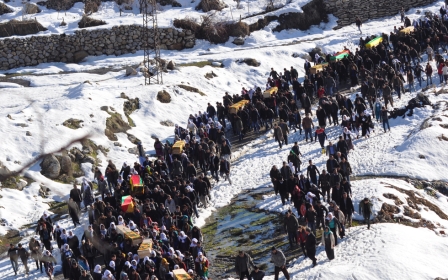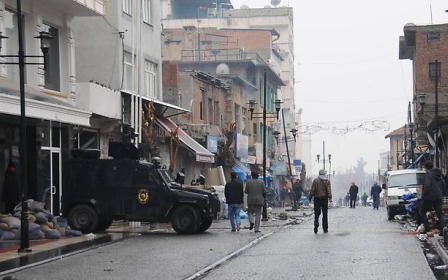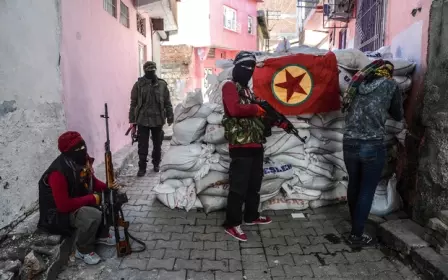Kurdish club becomes political football as it chases Turkish cup dream

ISTANBUL, Turkey – They have booked themselves into the Turkish football cup's quarter-final with an inspiring run. But the third-tier club Amedspor have found to their cost that in Turkey, sport and politics are seldom separate.
The unfashionable club from Turkey's largest Kurdish city, Diyarbakir, have dispatched two top division sides on their run to a last-eight tie with the giants of Fenerbahce on 9 February. But this success appears to have come at a cost.
Amedspor's officials allege the success has led to scores of supporters being arrested, a raid on the club's premises by counter-terrorism units, supporters being banned from the home leg of the Fenerbahce tie, and an unheard of 12-match ban on a key player for "politically motivated ideological propaganda".
The club's cup run comes as the Turkish-Kurdish conflict has flared after a three-year peace plan fell through last July. In recent months, cities in Turkey's southeast have become battlegrounds once again as the Turkish army fights the banned Kurdish PKK.
Amedspor's chairman, Ali Karakas, believes the club is being discriminated against politically and racially, simply because authorities find Kurdish success hard to stomach.
"We train every day surrounded by the sounds of tank and artillery shelling. These raids are not going to intimidate or demoralise us," Karakas told Middle East Eye. "But what we are facing is pure and simple racial discrimination and we will resort to every legal means available to seek justice."
Karakas said the club had been under the cosh at the start of the season, but the intimidation got worse because of their giant-killing acts in the cup. In January, the club's premises were raided by anti-terrorism police after a fan-run Twitter account dedicated the cup victory over top-tier Bursaspor to the Kurdish "guerrilla fighters" in Sur and Cizre.
"Why send a team of 40 counter-terrorism officers to investigate the source of a tweet? They could have just traced the IP address remotely or even just sent a few officers in plainclothes, who we would have gladly helped," Karakas said. "It is all just a ruse to intimidate us."
The Turkish Football Federation banned Amedspor supporters from the home leg with Fenerbahce for using chants and slogans at a cup tie against Medipol Basaksehir in Istanbul including "the resistance is everywhere".
Almost 100 supporters were also arrested.
Then, midfielder Deniz Naki was banned for 12 games by the TFF for "ideological propaganda" after using social media to dedicate the Bursaspor win to Kurds killed in the government crackdown. He signed off in Kurdish "Her biji azadi", or "Long live freedom."
Karakas has appealed against the decisions and says the club will take the matters to European football's governing body, UEFA, if their domestic appeals fail.
UEFA and FIFA, football's global governing body, both have clear statutes about political interference in football and racism.
In extreme cases, a country's federation can be suspended and its national team barred from international competition for political interference.
Cetin Cem Yilmaz, a Turkish sports analyst, said he could not remember a 12-match ban ever being handed out for "conducting ideological propaganda". However, stadium bans for fan behaviour are more common in Turkish football.
He said he did not think a charge of political interference against the TFF would stick. Although UEFA takes a tough line against racism, it is usually clubs and their fans that are reported, rarely national football federations – particularly for domestic games.
"It is not a secret that Turkish football is highly politicised, but I doubt the scale of this particular incident is enough to bring about a UEFA ban for Turkey's football federation or put the national team's participation in Euro 2016 at risk," Yilmaz told MEE.
"I believe of more pressing concern is Amedspor being able to get the stadium and player ban overturned in time for their quarter-final tie to give them a slightly better chance," he said.
Bilal Akkulu, a founder of the fan group Amedspor Barikat, was among supporters arrested after the Medipol game in Istanbul.
"We were arrested, taken away; some were mistreated by the police and even forced to sing the Turkish national anthem while being constantly abused," he told MEE.
He said the club's fans, players and staff face the vilest abuse at most away games.
"We are treated like mortal enemies at almost every away game and the worst abuse is hurled at us, but what happened at the Istanbul game was a new low."
A representative from the Basaksehir supporters group, 1453, however had a different view, saying that Amedspor's supporters had insulted national values.
"If any Amed supporters acted out of line, then our police forces did what was required and we fully support that," he said.
"We as a group, however, don't believe that all Amedspor supporters should be viewed as PKK sympathisers and also don't believe in mixing politics and football.
"But this issue [the conflict in the southeast] is above politics and something we will not negotiate on. We will respect all visiting teams and their fans as long as they respect our religion, flag and nation," he said.
Despite already facing steep odds, Amedspor will now face a Fenerbahce side - containing world-class players such as former Manchester United stars Robin Van Persie and Nani – deprived of their supporters and without a key player.
But none of this will dampen the optimism with which its fans approach their team's games.
"Whatever the circumstances, we will back our team to the full. Our team's success at least brings a little joy to our beleaguered people," said Akkulu. "We are going to win the cup."
New MEE newsletter: Jerusalem Dispatch
Sign up to get the latest insights and analysis on Israel-Palestine, alongside Turkey Unpacked and other MEE newsletters
Middle East Eye delivers independent and unrivalled coverage and analysis of the Middle East, North Africa and beyond. To learn more about republishing this content and the associated fees, please fill out this form. More about MEE can be found here.




